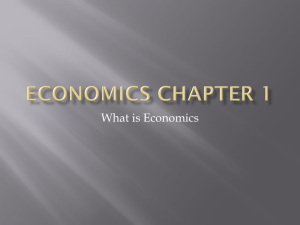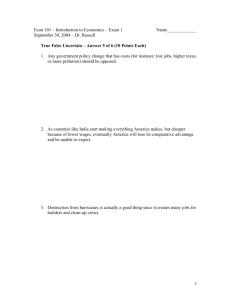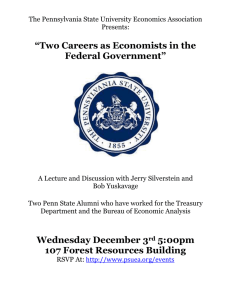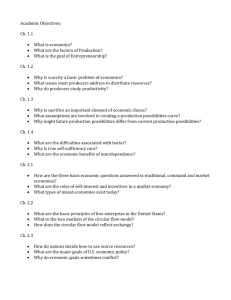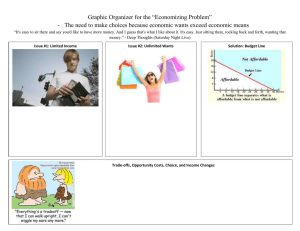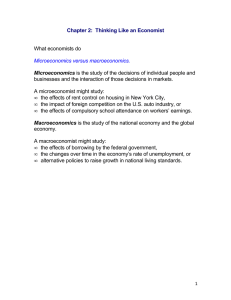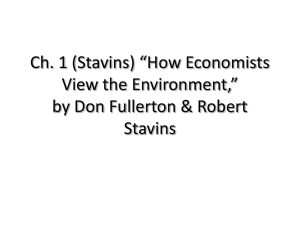Department of Economics
advertisement
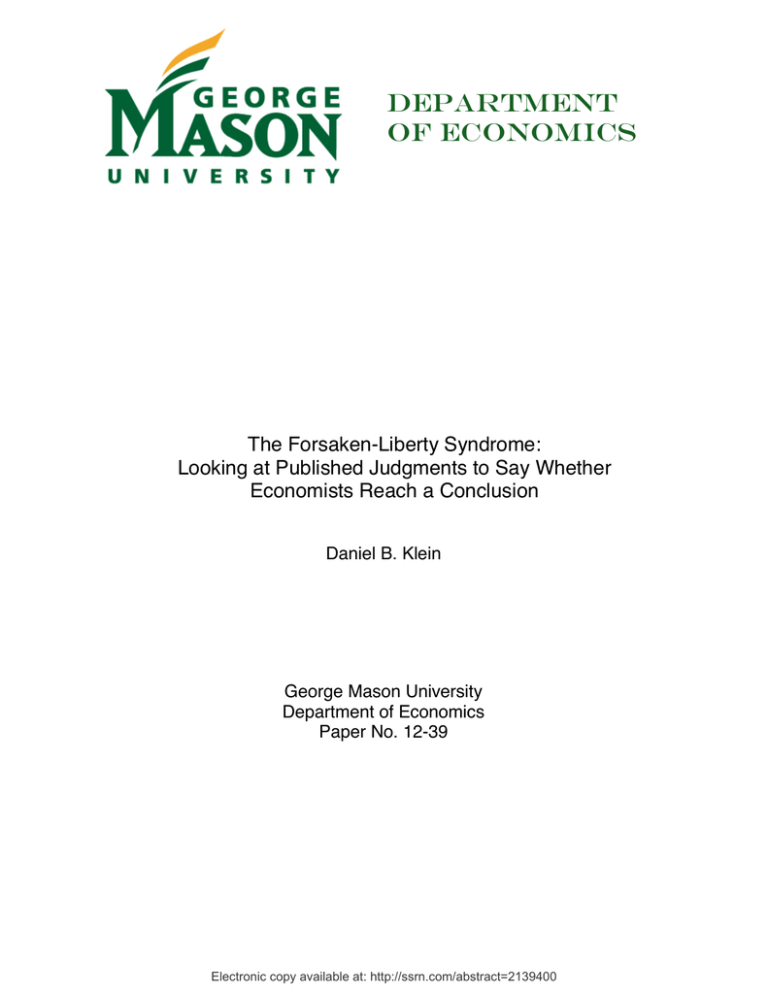
Department of Economics The Forsaken-Liberty Syndrome: Looking at Published Judgments to Say Whether Economists Reach a Conclusion Daniel B. Klein George Mason University Department of Economics Paper No. 12-39 Electronic copy available at: http://ssrn.com/abstract=2139400 1 The Forsaken-Liberty Syndrome: Looking at Published Judgments to Say Whether Economists Reach a Conclusion by Daniel B. Klein George Mason University, dklein@gmu.edu Abstract: Do economists reach a conclusion on a given policy issue? One way to answer the question is to survey economists at large. Another is to look at the published judgments of economists who have gone on the record. Relative to an anonymous survey, going on the record makes for much greater accountability, and presumably more personal responsibility. I discuss eleven studies of economists’ published judgments. Several of them show greater support for liberalization than found among economists at large. This is offered as evidence of what I call the forsaken-liberty syndrome. I discuss the nature of this test of such syndrome and point to some of the larger questions to which it relates. Keywords: Economists, judgment, liberalization, consensus JEL codes: A11, A13, A14 To appear in the American Journal of Economics and Sociology, in a special issue on the contributions of dissident economists, edited by Daniel Sutter. Acknowledgment: For valuable comments I thank Jason Briggeman, Tyler Cowen, and Robert Whaples, and for proof-reading, Hannah Mead. Electronic copy available at: http://ssrn.com/abstract=2139400 2 In this paper I discuss looking at published judgments to address the question of whether economists reach a conclusion on a policy issue. That task speaks to a larger matter, which I call the forsaken-liberty syndrome. But first I remark on how the paper relates to the theme of this AJES special issue, the contributions of dissident economists. Dissidence is exemplified by the miscreant who goes against the status quo, or even challenges it. The status quo is the context of our experience, knowledge, talk, and action. It is our usual point of departure. It is naturally focal, and people naturally give presumption to the status quo: The burden of proof is placed on the one proposing to reform it. When it dominates, the presumption of the status quo casts as dissident anyone who discounts that presumption and instead holds up some other. The type of dissident economist that is relevant for this paper is the classical liberal economist, who gives the presumption to the liberty principle. To such a liberal, policies that contravene the liberty principle should bear the burden of proof, even if they are the status quo. Adam Smith and Jeremy Bentham provide illustration. Even after cataloging all the exceptions, Jacob Viner wrote: “There is no possible room for doubt, however, that Smith in general believed that there was, to say the least, a strong presumption against government activity beyond its fundamental duties of protection against its foreign foes and maintenance of justice” (Viner 1927: 219, italics added). One of Smith’s exceptions was his endorsement of the status-quo ceiling on interest rates. Smith assumed the burden of proof, but not to Bentham’s satisfaction. In Defence of Usury, Bentham writes to Smith: On this occasion, were it any individual antagonist I had to deal with, my part would be a smooth and easy one. ‘You, who fetter contracts; you, who lay restraints on the liberty of Electronic copy available at: http://ssrn.com/abstract=2139400 3 man, it is for you’ (I should say) ‘to assign a reason for your doing so.’ That contracts in general ought to be observed, is a rule, the propriety of which, no man was ever yet found wrong-headed enough to deny: if this case is one of the exceptions (for some doubtless there are) which the safety and welfare of every society require should be taken out of that general rule, in this case, as in all those others, it lies upon him, who alledges the necessity of the exception, to produce a reason for it. … Should it be my fortune to gain any advantage over you [that is, Adam Smith], it must be with weapons which you have taught me to wield, and with which you yourself have furnished me… [A]ll the great standards of truth, which can be appealed to in this line, owe, as far as I can understand, their establishment to you … (Bentham 2008, 68) Thus Bentham tells Smith: You have taught us the presumption of liberty; you have made an exception in this case; I will show that your attempt to meet the burden of proof fails. Bentham’s critique is glorious and eventually carried the day; lore has it that Smith conceded the merit of Bentham’s case (see the Preface to Bentham 2008). There was a time when the presumption of liberty rose up to challenge the presumption of the status quo. Economists were once closely identified with the liberal presumption. Frédéric Bastiat (1964, 109) wrote: “the economists’ principle implies liberty.” Ludwig von Mises (1966, 67) said: “[E]conomics as such is a challenge to the conceit of those in power.” But the character of economists has changed a lot since the days of Smith, Bentham, and Bastiat. Now, in the United States, the ratio of professional economists who vote Democratic to those who vote Republican is about 2.5 to 1, and perhaps only about ten percent of professional economists show consistent support for free-market policy positions (Klein and Stern 2007). It is fair to say that economics has fallen back to the presumption of the status quo. In its approach to the question, “Do economists reach a conclusion?”, this paper deals indirectly with research of a great many economists. Many of those economists are ones who 4 have examined a status-quo policy and judged in favor of liberalization. The analysis often works from a presumption of liberty, and bolsters it. This paper, then, treats of dissident economists in the sense that it highlights work suggesting that certain status-quo contraventions of liberty fail to meet the burden of proof. How Should We Decide Whether Economists Reach a Conclusion? Indeed, the economist is rapidly becoming the stock butt for popular jest. ‘All the economists in the world if put end to end would not reach . . . a conclusion.’ Barbara Wootton (1938, 14) The ambitious hope would be that economists judged alike on all things economic, but we shall humbly take one policy issue at a time. One way to decide whether economists agree on a particular policy issue is to survey economists at large, for example from the membership of the American Economic Association. Many such U.S. surveys have been done -- some since 2000 include Fuller and Geide-Stevenson (2003), Klein and Stern (2005), Whaples (2006, 2009), Davis et al (2011), and May and Whaples (forthcoming). On a few issues, such as international trade, economists overwhelmingly support a liberal position. And economists are considerably more liberal (used throughout this paper in the Gladstonean sense) than academics in other social-science and humanities fields (Klein and Stern 2005, 283). On most issues, however, economists are quite mixed. Bearing in mind that monkeys throwing darts would generate a uniform distribution, one is struck by the fact that Likert-scale results quite often show some Ushapedness (or lack of single-peakedness), revealing cleavages between interventionists and 5 liberals. In fact, economics shows less consensus on policy than do the other social sciences, for the simple reason that the other fields harbor so few conservatives and libertarians (id., 286). People tap bartenders for beer and economists for economic opinion. Economists are thought to be more knowledgeable and more responsible in forming judgments. But how well do surveys target knowledge and incentivize responsibility? The random economist who answers a survey does not necessarily know much about the issues asked, and he has little incentive to judge responsibly. He sits alone in his office. The survey is anonymous, so there is little accountability. His name is not attached to his responses. He is not open to challenges to his responses. Would you drink a beer that was delivered in some analogous fashion? There is something to be said for anonymity, however. In journalism, reporters sometimes prefer that sources speak in confidence and remain unidentified, because the veil of anonymity makes their communication more telling. The source can be more candid precisely because he does not have to face repercussions of going on the record. The same logic would apply for the refereeing of submissions to a scholarly journal. As for an economist writing or speaking publicly on a policy issue, he, too, may feel certain incentives that lead him to “falsify” his beliefs (Kuran 1995), such as incentives of political opportunism, academic prudence, and pandering in general. There is, however, an important difference between the case of the journalist’s source and the economist who speaks publicly: The impulse to speak comes from the economist himself, whereas a source related to a news story is tapped directly by the journalist. A new development helps us to think about the distinction between “on-record” and “atlarge” views of economists, and precisely because this new development straddles the two. At the University of Chicago, the Booth School of Business has created a fixed yet ongoing panel of 6 37 economists to respond to survey-type questions, on the record. The panel is part of the school’s Initiative on Global Markets, and is here referred to as the IGM Panel. The IGM Panel is an example in which each panelist, such as Claudia Goldin, responds on the record. On the other hand, the panelist is being tapped on questions that may have nothing to do with her research, and about which she may not be particularly knowledgeable (though she may do research prior to answering the question), so in that respect is it like a survey of economists at large. The self-sorting aspect of normal on-record judgments does not apply for the IGM Panel. I think that on-record scholarly judgments remain a special way to target knowledge and responsibility. When an economist steps forward to publish a judgment on a policy issue, he does so because he thinks he has something to add, and he attaches his name to the statement. He opens himself up to challenge. Such circumstances usually impel greater care. Moreover, the self-sorting means that the on-record economists are not a random sample of economists at large. All this is not meant to suggest that stepping forward and going on the record means getting it right, only that judgment emerging from that combination is generally better than judgment solicited by others and rendered in seclusion and anonymity. In this paper, the question that really ends up being the one that matters is this: How strong are the forces that impel an economist to step forward and publish a judgment that is more pro-liberalization than he really believes? I do not claim that such forces are entirely nonexistent, but I think they are small enough in relation to the healthy incentives to justify the approach pursued here. The Forsaken-Liberty Syndrome 7 Do we find discrepancies between the two sorts of tests? Yes, sometimes we do. To my mind, the best illustration of the discrepancy is the comparison of results on the issue of the control of pharmaceuticals by the Food and Drug Administration. When randomly sampled AEA members were asked their position on “Pharmaceutical market regulation by the FDA,” the response distribution was very preponderantly on the side of “support,” rather than “oppose.”1 But an analysis of the published judgments by economists on the core FDA issues shows that such judgments very preponderantly favor liberalization (Klein 2008, 318-324). I believe that the FDA case exemplifies a syndrome: Certain interventions that are hallowed and important to statist ethos and mythos are wrongheaded and fail to meet the liberal burden of proof; a substantial majority of economists are at the political center or the Democratic left, and their thinking and survey responses go along with such interventions; meanwhile such economists, with a few exceptions, are not willing to go on record with support for such interventions because justification is so poor, and that means that the judgments that do go on record come from economists who are willing to stray from such ethos and mythos. Having the hunch of such syndrome, the editors of the journal called Econ Journal Watch, of which I am the chief editor, decided to cultivate and publish original studies under the heading “Do Economists Reach a Conclusion?” Eleven papers have been completed. The studies are not so much a review of the literature as a review of policy judgments expressed by economists. The reasoning behind such judgments gets treated, but the central tasks are to 1 Specifically, 48.9 percent chose “Support strongly,” 21.2 percent chose “Support mildly,” 15.5 percent “Have mixed feelings,” 8.3 percent chose “Oppose mildly,” and 5.7 percent chose “Oppose strongly.” Raw numbers are provided in Klein and Stern (2006, 334). 8 interpret, organize, and report the judgments. The eleven policy topics are: sports subsidies, the FDA, organ liberalization, rent control, drug policy, postal reform, medical licensing, taxi deregulation, rail transit, road pricing, and household and municipal recycling. Here I do not summarize each of the papers but rather discuss the broader questions to which the set might speak. Does the set serve as meta-evidence of a forsaken-liberty syndrome wherein liberalization finds more consistent support among on-record economists than at-large economists? I abbreviate “Do Economists Reach a Conclusion” as DERAC, and speak of the eleven studies as the DERAC papers.2 Table 1 provides information about the eleven studies. Table 1: Eleven EJW papers on whether economists reach a conclusion. Issue Authors Pub. date A liberalization Preponderance among on-record economists? Data on at-large economists Are the on-record economists more proliberalization than at-large economists? Three issues on which on-record and at-large economists seem to be about the same and to favor liberalization 1 Sports subsidies Sept 08 Strong yes Whaples 06 About the same Rent control Dennis Coates and Brad R. Humphreys Blair Jenkins 2 Jan 09 Pretty strong yes IGM Panel Road pricing Robin Lindsey May 06 Strong agreement on pricing, but not other issues IGM Panel Presumably about the same Presumably about the same 3 Three issues on which on-record economists seem to be significantly more supportive of liberalization 2 There is another paper in the DERAC section of Econ Journal Watch, namely Briones and Rockoff (2005), that is not treated in the present paper. It is about whether economists reach a conclusion about the success of free-banking episodes in history, not about the policy issue itself. Also, one of the eleven papers treated here, namely Klein (2008), is located in a section of the journal other than DERAC, simply because it would fit in two sections and had to be located in one or the other. 9 than at-large economists 4 FDA Daniel Klein 5 Medical licensing Postal reform Shirley Svorny 6 Rick Geddes Sept 08 Aug 04 Apr 04 Strong yes Fairly strong yes Fairly strong yes Klein and Stern 05; Davis et a 11 Whaples 09; Davis et al 11; IGM Panel Whaples 06 Yes Yes Yes Two issues on which on-record economists seem to be mildly more supportive of liberalization than atlarge economists 7 8 Organ liberalization Drug policy Jon Diesel Mark Thornton Sept 10 Apr 04 Pretty strong yes Fairly strong yes Whaples 09; Davis et al 11 Whaples 06; Klein and Stern 05; Davis et al 11; IGM Panel Yes, mildly Yes, mildly Two issues on which we do not know about at-large economists 9 Taxi deregulation 10 Rail transit Adian Moore and Ted Balaker Ted Balaker and C.J. Kim Jan 06 Fairly strong yes Unknown Sept 06 Qualified yes Unknown An issue on which on-record economists do not “reach a conclusion” 11 Household and municipal recycling Matthew Gunter Jan 07 No Whaples 09 Unsure, perhaps the same After describing the methods of the DERAC papers and the apparent results of our test, I then turn back and offer some ruminations on the whole idea of such a test. Methods of the Eleven DERAC papers The eleven papers share a common approach, with some variation, of course. The main facets follow in bold type-face: Defining “economist.” The papers generally count an author as an “economist” if any of the following criteria are met: he has a postgraduate degree in economics; he has taught college or university economics; he has been employed in a job with “economist” in the title; he has published more than incidentally in professional economics journals. 10 Defining the issue and the positions on the issue. Each policy topic has particularities that might suggest a variety of positions. Even the experts might disagree on how best to formulate “the issue.” The authors of the DERAC papers find sensible ways of distinguishing positions. In most cases, the issue lends itself to formulation in terms of liberalization, that is, a relaxation of restrictions on the freedom of contract (for example, licensing laws) or on freedom in the use of private property (for example, drug laws). Sometimes the lines of property and consent are not so clear, notably in the issue of organ policy when economists support reforms toward “presumed consent” and “mandated choice.” One might also use the term “liberalization” to include the reduction of tax-financed subsidies, for example of sports or rail transit. The study that least well fits a liberalization formulation is the one that focuses on road pricing (Lindsey 2006), although retrofitting freeways with road pricing might relieve tax-payers somewhat, as well as put the freeway in a better position to be privatized. Perhaps the broad idea is better captured by degovernmentalization, but I stick with liberalization. Method of canvassing for published judgments. The canvassing method varies among the papers, some confining the scope to scholarly literature, some including anything written by an economist. But the DERAC authors always describe their canvassing method. Svorny (2004), Geddes (2004), Lindsey (2006), and Coates and Humphreys (2008) are authorities on the treated topic, and they focus on the scholarly material of economists working on the topic. Lindsey (2006), Gunter (2007), Jenkins (2009), and Diesel (2010) start with Econlit searches and either fan out systematically or supplement in various ways, sometimes effectively scooping up everything they find. The papers that most freely include popular as well as scholarly sources – but all written by an economist – are Thornton (2004), Gunter (2007), Klein (2008), and Diesel (2010). I do not think that readers should suspect cherry-picking or opportunistic inclusion and 11 exclusion. Even though the DERAC authors are themselves generally liberal, they are interested in spotlighting and examining the judgments and arguments in favor of intervention. In some cases, the study is pursued and the results turn out other than the DERAC author anticipated – a notable example is Gunter (2007) on household and municipal recycling, which finds, contrary to the author’s expectation, that there is no consensus. Worries of opportunistic inclusion or exclusion should also be allayed by the “open-source” aspects of the discourse: If a reader were to find that a DERAC author had omitted relevant economists, that reader could bring it to the attention of the journal. Moreover, every article in Econ Journal Watch is stamped with a link that enables readers to comment directly on that article online. Thus far, no charges of opportunistic inclusion or exclusion have been aimed at any of the DERAC articles. The agenda of Econ Journal Watch entails standing up for the broad verities of liberal economics, but it also entails showing the failure of the economics profession to do so. The journal has no proclivity to make the profession out to be more liberal than it is. The extent and nature of the problem needs to be assessed as accurately as possible. On “judgment”: The object judged of. With an issue formulated in terms of vying positions, the paramount object for judgment would be a position on the issue. But a treated author often does not clearly identify a position on the issue, much less express a judgment of it. He may, however, treat of various signal factors that would figure into a judgment on a position, such as whether rent-control reduces housing supply or affects housing quality. DERAC authors are careful to clarify the object judged of, and are careful not to read judgment of a factor as something wider than it is. On “judgment”: Reading the author’s message. Instead of saying, “The government should abolish rent control,” the economist might say, “Abolishing rent control would improve 12 social welfare.” Or he might speak to only certain factors in the issue. But one hopes that economic analysis is carried out on an understanding that the author treats of the things that are most important to the issue, and we use that understanding to infer the author’s drift. Also, we read the author’s work comprehensively, to see qualifications and assess the balance. DERAC authors assess the vagueness or clarity of a judgment, sometimes even schematically (Klein 2008; Diesel 2010, 328) – somewhat like the IGM Panel, which asks its 37 panelists to specify the confidence they have in their response. Also, wherever necessary, DERAC authors distinguish between narrower and wider reform positions. Documenting judgments and deciding whether they “reach a conclusion.” The DERAC authors are responsible for documenting the basis for characterizing an author’s judgment. Most of the papers are loaded with quotations, while others hive off the quotations into appendices (Klein 2008, Diesel 2010). Meanwhile, many of the papers give a twodimensional “scorecard” that tabulates types of judgment and gives the names of the authors falling within each cell (Moore and Balaker 2006, Gunter 2007, Klein 2008, Diesel 2010). The DERAC author decides whether on-record economists “reach a conclusion” on the basis of whether there is a clear preponderance of some kind. Defining “published.” For our purposes, the most essential feature in making a judgment “published” is that it is “on the record.” The speaker attaches his name to the judgment. As noted, the papers vary in how widely they cast their net in canvassing for published judgments. Technological developments are making the lines of “published” somewhat blurry. A few DERAC papers include judgments found in blog posts. Some might doubt the seriousness of such discourse, but, on the other hand, such discourse is especially accountable to challenge, for example in the comments field or at other blogs. Lines are also blurred when researchers target 13 specific economists to respond to a questionnaire on the record.3 Also, technology aids creation of economist petitions. Does signing a petition count as a published judgment? There has not been, to my knowledge, a petition fitting any of the eleven DERAC topics. On the other hand, the Chicago Booth Initiative on Global Markets puts its 37 economist panelists on the record. The panel has weighed in on rent control, drug policy, road pricing, and medical licensing, in each case coming to a very preponderant agreement that aligns with what the DERAC author finds on the topic. Some Evidence of a Forsaken-Liberty Syndrome In Table 1, there are columns summarizing whether we find on-record economists to be more pro-liberalization than at-large economists. We do find some cases of such discrepancy, which might be taken as evidence for a forsaken-liberty syndrome. But, first, we look at three cases on which the on-record support for liberalization is high but about the same as for at-large economists. On the governmental subsidization of sports franchises, stadiums, and mega-events, Coates and Humphreys (2008) find a strong consensus 3 Subsequent to my 2008 article on the FDA, Jason Briggeman, Kevin Rollins, and I designed an online survey about “pre-market approval,” the banning of new drugs and devices until individually permitted by the FDA. We publicly called 305 health scholars, mostly economists, to respond on the record to the questionnaire (Klein and Briggeman 2010), and we pestered each of them with repeated emails. Of the 305 economists contacted, 44 responded. Of those, 23 supported pre-market approval (Briggeman, Klein, and Rollins 2010). Should the responses from the economists among them be counted as published judgments in favor of pre-market approval? In my view they should be heavily discounted. At any rate, the investigation might provide an example of how a line of cultural analysis can be self-subverting. 14 among on-record economists. Meanwhile, a sample of at-large economists were asked by Whaples (2006) about whether “Local and state governments in the U.S. should eliminate subsidies to professional sports franchises.” Eighty-five percent either agreed (strongly or simply), and only five percent disagreed. It is fair to say that on-record and at-large economists are about the same on this issue. In my humble judgment, sports subsidies are an exemplary case of corporate welfare and public foolishness. On this matter, the Journal of Economic Perspectives has taken care to educate economists at large, publishing a fine analysis by Siegfried and Zimbalist (2000). On rent control, Jenkins (2009) provides a thorough review of the economics literature on rent control in the United States. She writes in the abstract: “My findings cover research on many dimensions of the issue, including housing availability, maintenance and housing quality, rental rates, political and administrative costs, and redistribution. It is fair to say that the literature points to a conclusion against rent control, yet as of 2001, about 140 jurisdictions in the United States persist in some form of the intervention.” These findings seem aligned to the views of at-large economists. Although no survey since 2000 has asked economists about the matter, the IGM Panel – which is a survey of 37 economists, but in which the judgment of each is on the record -- judged very uniformly against the idea that rent control has “had a positive impact” on the amount and quality of affordable housing. On road pricing, Lindsey (2006) provides a rich intellectual history of the idea and related policy issues. He writes in the abstract: “Practically all economists who write on the matter agree that where there is significant congestion on highways, the price should not be zero.” He adds: “Beyond that primary insight, however, there is much disagreement. Economists disagree over how to set tolls, how to cover common costs, what to do with any excess revenues, 15 whether and how ‘losers’ from tolling previously free roads should be compensated, and whether to privatize highways.” As for at-large economists on the basic questions of road pricing, again we do not have evidence on at-large economists, but we find that the IGM Panel also strongly supports it. On the assumption that the at-large responses would be similar to the IGM Panel – though I suspect that on balance the IGM panel is a bit more liberal than economists at large – I have chalked this one up as “about the same.” Thus, we figure that on three of the DERAC topics – namely, sports, rent control, and road pricing – we find strong agreement between on-record and at-large economists in favor of liberalization. Other issues suggest evidence of a forsaken-liberty syndrome, in that the on-record economists show a stronger pattern in favor of liberalization than do the at-large economists. The strongest case is on the restrictions on drugs and devices administered by the FDA. With a few exceptions, notably Paul Krugman, I found judgment to be very preponderantly in favor of liberalization on the core issues of pre-market approval, FDA control of manufacturer speech, and prescription requirements (Klein 2008). As noted previously, at-large economists appear to be considerably more favorable to FDA regulation. Further, in the survey of economics professors by Davis et al (2011), among the 299 respondents only 42 percent opposed (strongly or not strongly) “Tighter restrictions for the permitting of new pharmaceuticals and medical devices.”4 Thus, there seems to be a large discrepancy between on-record and at-large economists. On this extremely important matter the Journal of Economic Perspectives and other AEA journals have failed to educate the at-large economists. 4 In this paper I report the results on four questions of the Davis et al 2011 survey, but the reported results are not actually provided by that paper. The survey data will be provided online soon and can be obtained from me. 16 On medical licensing, Svorny (2004) summarizes as follows: “Economists who have examined the market for physician services in the United States generally view state licensing as a means by which to enforce cartel-like restrictions on entry that benefit physicians at the expense of consumers. Medical licensing is seen as a constraint on the efficient combination of inputs, a drag on innovations in health care and medical education, and a significant barrier to effective, cost efficient health care” (abstract). She shows that even such economists as Kenneth Arrow and Hayne Leland have made statements indicating that voluntary state certification is preferable to mandatory licensing. Meanwhile, the skepticism toward licensing is perhaps not as solid among at-large economists. When Whaples (2009: 341) asked whether “Barriers to entering the medical profession in the U.S. should be reduced,” 64 percent of at-large economists agreed (strongly or simply), while 11 percent were neutral and 25 percent disagreed (strongly or simply). In the survey by Davis et al (2011), only 46 percent opposed (strongly or not strongly) “Tighter requirements on occupational licensing.”5 I regard the discrepancy to be large, as Svorny found very few on-record economists pointing to a conclusion against reducing such barriers. The general topic of occupational licensing is scandalously understudied.6 The Journal of Economic Perspectives published a nice piece on the topic by Morris M. Kleiner (2000), but the topic deserves much more attention. Incidentally, Kleiner has since published what is now probably the best current book on the topic (Kleiner 2006). 5 Meanwhile, the IGM Panel was very preponderantly favorable to loosening range-of-service restrictions on licensed practitioners in health care. This makes for a rough comparison with the at-large surveys, indicating that the IGM Panel is a bit more liberal than economists at large. 6 On the scant treatment of occupational licensing in labor economics textbooks, see Stephenson and Wendt (2009). 17 On postal reform, Geddes (2004) focuses on ten economists who, in his judgment, have been those most prominent in economic research on the topic. He writes: “The ten vital economists surveyed here express surprisingly similar opinions on the proper direction for postal reform. The vast majority advocate some combination of privatization and elimination or relaxation of the delivery monopoly” (abstract). Geddes also treats the judgments of two economists who have not done research on the topic, Paul Samuelson and Joseph Stiglitz, both of whom are vaguely favorable to the post office and certainly do not indicate support for weakening the monopoly privileges. As for at-large economists, when Whaples (2006) asked whether, “The legal monopoly held by U.S. Postal Service (USPS) on the delivery of first class mail should be ended,” only 43 percent agreed (strongly or simply), while 25 percent were neutral and 32 percent disagreed (strongly or simply). Next we turn to two cases in which on-record economists are “mildly more supportive of liberalization,” as stated in Table 1. The comparisons are only rough. In these two cases, we see economists leaning toward liberalization, but I will suggest that in each case the on-record economists seem to lean that way somewhat more than the at-large economists. The federal government bans payments to organ donors. Diesel (2010) writes: “I classify 72 economists and find that most of those economists who publish a judgment favor liberalization to one extent or another” (abstract). As for at-large economists, when Whaples (2009) asked whether, “The U.S. should allow payments to organ donors and their families,” 70 percent agreed (strongly or simply), while 14 percent were neutral and 16 percent disagreed (strongly or simply). In the survey by Davis et al (2011), only 45 percent opposed (strongly or not strongly) “Tighter restrictions on the buying and selling of human organs.” The on-record economists seem to be somewhat more pro-liberalization. 18 On the issue of illicit drugs, Thornton (2004) provides an extensive review of published judgments and finds a clear preponderance in favor of decriminalization and, to a lesser extent, legalization. Any comparison with at-large economists will be quite inexact, since the issues vary by the drugs treated and the reforms proposed. When “hard” drugs are specified, a slight majority of at-large economists (strongly or mildly) support controls on such drugs (Klein and Stern 2006, 335). In the survey by Davis et al (2011), 49 percent opposed (strongly or not strongly) “Tighter restrictions on ‘hard’ drugs such as cocaine and heroin.” But when Whaples (2006) asked whether, “The U.S. should legalize marijuana,” a slight majority agree (strongly or simply), and the IGM Panel judges even more favorably toward a “Netherlands” approach on “soft drugs.” On the whole, Thornton’s findings indicate a pattern among on-record economists that is somewhat more consistently supportive of liberalization. Finally, there are three papers that do not provide evidence of a forsaken-liberty syndrome. On taxi deregulation, Moore and Balaker (2006) summarize as follows: “Here we provide a tour of the main points of contention in the scholarly research on the desirability of taxi deregulation. We find that most economic studies of taxi deregulation find it to be on net beneficial. … The support for taxi deregulation is preponderant, but not overwhelmingly so. We suggest that the literature favorable to deregulation is richer and broader than the unfavorable literature, which disproportionately is model-building. There is wide consensus that taxi deregulation has been less impressive than advocates had hoped” (abstract). Meanwhile, none of the surveys of economists at large have asked about taxi deregulation. On government operation or subsidization of rail transit, Balaker and Kim (2006) deal with complexities of the issue and summarize as follows: “Of those economists who offer a bigpicture view, there appears to be wide, though not unanimous, agreement that rail’s costs exceed 19 its benefits. And it seems that almost all economists who write about rail agree that various demographic features, such as suburbanization, the declining influence of central business districts, and increasing wealth will make it increasingly difficult to design successful rail systems” (abstract). Again, none of the surveys of economists at large have asked about the issue. I would guess that at-large economists would be less opposed to government subsidies than the on-record economists, but I have no evidence for the suspicion. On household and municipal recycling, Matthew Gunter (2007) used Econlit, Google, and the library catalog to locate on-record judgments, and he organizes and tabulates the results showing a range of views and no consensus, and certainly not in favor of liberalization. The amorphous results do not conflict with what we know about how at-large economists judge the matter. When Whaples (2009) asked whether “Laws mandating municipal curbside recycling should be eliminated,” only 25 percent agreed (strongly or simply), while 58 percent disagreed (strongly or simply). In sum, several of the eleven DERAC papers have found no apparent difference between on-record and at-large economists, but up to five find on-record judgment to be at least somewhat more consistently pro-liberalization. I proceed to discuss whether this test is meaningful, and what it might mean. Ruminations, Confessions, and Concluding Remarks It would be natural for a skeptic to object as follows: “We know that the researchers involved in DERAC are staunch believers in the free market. Even if we grant the findings of the studies provided, what about the studies not provided? What about cases in which it would 20 be found that on-record economists are less pro-liberalization than at-large economists? We cannot count on you to turn those up for us.” The ad hominem is sound and proper, and the logic is flawless. There may well be cases in which on-record economists show a consensus in favor of some intervention, while the atlarge economists are less favorable to the intervention. My own suspicion is that there are no such cases. It would be very interesting to query economists of various ideological stripes about whether they might postulate any such cases, or whether they agree that such cases are probably an empty set. Would any economist dispute my suspicion? My view of the matter, in the broadest terms, is that human culture generally, and in particular Anglo-American culture since the great transformation epitomized by the passings from President Cleveland to Presidents Roosevelt, Wilson, and Roosevelt, and from Prime Minister Gladstone to Prime Ministers Asquith and George, has numerous strong biases that tend toward the under-appreciation of liberalism. Plain talk of liberty and coercion are indeed matters of great taboo. But that does not mean that such ideas are not playing a fundamental role in people’s thinking and judgments.7 The taboos and biases propel the establishment of very bad policies, which are culturally protected by notions that will not, upon responsible scrutiny, pass muster on customary standards of social betterment – for example, in my view, drug prohibition, 7 Hedengren et al (2010) analyze the 10,792 signatures of 6,030 different individuals on 35 economist petitions, and they turn up the remarkable finding that, above a moderate threshold for being active in signing petitions, virtually every individual signs at least quite preponderantly either in line with the liberty principle or against it. This result indicates that the liberty principle is very central in the judgment of economists, or at least those who sign petitions. 21 occupational licensing, the prohibition of cash payments to organ donors, and the restrictions administered by the FDA make us less healthy, less wealthy, and less secure. I see the taboos and biases as so deep and pervasive that I do not expect even on-record economists to arrive at and state plainly good judgment on the root matters of the issue. Still, liberal enlightenment works to check the train of folly, and, I find some topics on which most on-record economists still get right the direction for reform. Thus, in my view, it is not likely that scholars who bear the responsibility of going on the record would come to conclusions that are less liberal than those of the general public or its subgroup, economists at large. If, then, we accept the idea that there is among economists a forsaken-liberty syndrome, illustrated by several of the DERAC papers, and we ask why it exists, the answer, I say, must be but a part of a much larger discussion about why the vast majority of people vastly underappreciate the presumption of liberty. Economists at large are but part of a much larger problem, and the diagnosis would reach far beyond their precincts. Many economists operate within and are the products of cultural ecologies enveloped by the apparatuses of government intervention, and their work should be interpreted accordingly.8 Consider the American Economic Association. It is an establishment-oriented, professional organization, and as such it is normal that it would be oriented toward the status quo. We should not expect that it would elevate those who think that many government agencies and interventions are wrongheaded at root and should be abolished. Moreover, the AEA is run by elite academics. My impression is that in the matter of ideological sensibilities the economics 8 Econ Journal Watch articles that treat of this matter include White (2005), Klein with DiCola (2004), and Pasour (2004). 22 profession has been trending toward the academic norm, and that it will continue to do so.9 Also, we should bear in mind that many or even most of the founders of the AEA were progressives, nationalists, or social democrats (on Richard T. Ely, see Thies and Daza 2011). Enlightenment has a force of its own, and sometimes it will match the forces that work against it. Just as Bentham eventually carried the day on ceilings on interest rates, latter-day and, alas, now dissident liberal economists have no doubt altered the balance between the presumption of the status quo and the presumption of liberty, for example on international trade, agricultural subsidies, drug prohibition, school vouchers, and conscription.10 Perhaps economic enlightenment will spread on some issues, such as sports subsidies, organ policy, occupational licensing, and the FDA. But it would be foolhardy to suppose that academia provides a setting in which enlightenment has the upper hand. Surely the minority who uphold a presumption of liberty will remain vital and make their voices heard, but their discourse might still be regarded as a sort of dissidence. Even in the heyday of the liberal era, William Gladstone in 1878 sized up academia as follows: “I trace in the education of Oxford of my own time one great defect. Perhaps it was my own fault; but I must admit that I did not learn, when at Oxford, that which I have learned since, viz., to set a due value on the imperishable and inestimable principles of human liberty. 9 McEachern (2006) provides data on campaign contributions during the 2004 election cycle. The data strongly indicate that the elites of the AEA supported the Democratic Party vastly more than the Republican Party and that the lopsidedness increases the higher up we go in the AEA structure. As for the ideological sensibilities of the AEA membership at large, Klein et al (2012, 153) finds that it is like the general population of U.S. economics professors. 10 We think, of course, of Milton Friedman. On the role of economists, especially Friedman, in the end of military conscription, see Henderson (2005). 23 The temper which, I think, too much prevailed in academic circles, was to regard liberty with jealousy and fear …” (Gladstone quoted in Cook 2008, 86). References Balaker, Ted and Cecilia Joung Kim. (2006). “Do Economists Reach a Conclusion on Rail Transit?” Econ Journal Watch 3(3): 551-602. http://econjwatch.org/articles/doeconomists-reach-a-conclusion-on-rail-transit Bastiat, Frédéric (1964). Selected Essays in Political Economy. Ed. G. B. de Huszar, trans. S. Cain. Princeton: D. Van Nostrand. Bentham, Jeremy. (2008). Gulphs in Mankind’s Career of Prosperity: A Critique of Adam Smith on Interest Rate Restrictions. [An extract of Defence of Usury]. Econ Journal Watch 5(1): 66–77. http://econjwatch.org/articles/gulphs-in-mankind-s-career-of-prosperity-acritique-of-adam-smith-on-interest-rate-restrictions Briggeman, Jason, Daniel B. Klein, and Kevin D. Rollins. (2010). “44 Economists Answer Questionnaire on the Pre-Market Approval of Drugs and Devices.” Econ Journal Watch 7(2): 162-173. http://econjwatch.org/articles/44-economists-answer-questionnaire-on-thepre-market-approval-of-drugs-and-devices Briones, Ignacio and Hugh Rockoff. (2005). “Do Economists Reach a Conclusion on FreeBanking Episodes?” Econ Journal Watch 2(2): 279-324. http://econjwatch.org/articles/do-economists-reach-a-conclusion-on-free-bankingepisodes Coates, Dennis and Brad R. Humphreys. 2008. "Do Economists Reach a Conclusion on Subsidies for Sports Franchises, Stadiums, and Mega-Events?" Econ Journal Watch 5(3): 294-315. http://econjwatch.org/articles/do-economists-reach-a-conclusion-on-subsidiesfor-sports-franchises-stadiums-and-mega-events Cook, Richard B. (2008). The Grand Old Man, or, The Life and Public Services of the Right Honorable William Ewart Gladstone, Four Times Prime Minister of England. Publishers’ Union. First published 1898. 24 Davis, William L., Bob Figgins, David Hedengren, and Daniel B. Klein. (2011). “Economics Professors’ Favorite Economic Thinkers, Journals, and Blogs (along with Party and Policy Views).” Econ Journal Watch 8(2): 126-146. http://econjwatch.org/articles/economics-professors-favorite-economic-thinkers-journalsand-blogs-along-with-party-and-policy-views Diesel, Jon. (2010). “Do Economists Reach a Conclusion on Organ Liberalization?” Econ Journal Watch 7(3): 32-336. http://econjwatch.org/articles/do-economists-reach-aconclusion-on-organ-liberalization Fuller, D. and D. Geide-Stevenson. (2003). “Consensus among Economists: Revisited.” Journal of Economic Education 34 (4): 369-87. Geddes, Rick. (2004). “Do Vital Economists Reach a Conclusion on Postal Reform?” Econ Journal Watch 1(1): 61-81. http://econjwatch.org/articles/postal-reform Gunter, Matthew. (2007). “Do Economists Reach a Conclusion on Household and Municipal Recycling?” Econ Journal Watch 4(1): 83-111. http://econjwatch.org/articles/doeconomists-reach-a-conclusion-on-household-and-municipal-recycling Hedengren, David, Daniel B. Klein, and Carrie Milton. (2010). “Economist Petitions: Ideology Revealed.” Econ Journal Watch 7(3): 288-319. http://econjwatch.org/articles/economistpetitions-who-is-signing-what Henderson, David R. (2005). “The Role of Economists in Ending the Draft.” Econ Journal Watch 2(2): 362-376. http://econjwatch.org/articles/the-role-of-economists-in-ending-thedraft IGM Panel. Initiative on Global Markets at the University of Chicago Booth School of Business: http://www.igmchicago.org/igm-economic-experts-panel Jenkins, Blair. (2009). “Rent Control: Do Economists Agree?” Econ Journal Watch 6(1): 73-112. http://econjwatch.org/articles/rent-control-do-economists-agree Klein, Daniel B. 2008. “Colleagues, Where Is the Market Failure? Economists on the FDA.” Econ Journal Watch 5(3): 316-348. http://econjwatch.org/articles/colleagues-where-isthe-market-failure-economists-on-the-fda 25 Klein, Daniel B. and Jason Briggeman. (2010). “305 Economists Called to Answer Questionnaire on the Pre-Market Approval of Drugs and Devices.” Econ Journal Watch 7(1): 99-106. http://econjwatch.org/articles/305-economists-called-to-answerquestionnaire-on-the-pre-market-approval-of-drugs-and-devices Klein, Daniel B., William L. Davis, Bob G. Figgins, and David Hedengren. (2012). “Characteristics of the Members of Twelve Economic Associations: Voting, Policy Views, and Favorite Economists.” Econ Journal Watch 9(2): 149-162. http://econjwatch.org/articles/characteristics-of-the-members-of-twelve-economicsassociations-voting-policy-views-and-favorite-economists Klein, Daniel B., with Therese DiCola. (2004). “Institutional Ties of Journal of Development Economics Authors and Editors.” Econ Journal Watch 1(2): 319-330. http://econjwatch.org/articles/institutional-ties-of-journal-of-development-economicsauthors-and-editors Klein, Daniel B. and Charlotta Stern. (2005). “Professors and Their Politics: The Policy Views of Social Scientists.” Critical Review 17 (3/4): 257-303. http://www.criticalreview.com/2004/pdfs/klein_stern.pdf Klein, Daniel B. and Charlotta Stern. (2006). “Economists’ Policy Views and Voting.” Public Choice 126: 331-342. Klein, Daniel B. and Charlotta Stern. (2007). “Is There a Free-Market Economist in the House? The Policy Views of American Economic Association Members.” American Journal of Economics and Sociology 66(2): 309-334. http://www.gmu.edu/departments/economics/klein/PdfPapers/Klein-Stern AJES 2007.pdf Kleiner, Morris M. (2000). “Occupational Licensing.” Journal of Economic Perspective 14(4): 189-202. Kleiner, Morris M. (2006). Licensing Occupations: Ensuring Quality or Restricting Competition? Kalamazoo, Mich.: W.E. Upjohn Institute for Employment Research Kuran, Timur. (1995). Private Truths, Public Lies: The Social Consequences of Preference Falsification. Cambridge, MA: Harvard University Press. 26 Lindsey, Robin. (2006). “Do Economists Reach a Conclusion on Road Pricing? The Intellectual History of an Idea.” Econ Journal Watch 3(2): 292-379. http://econjwatch.org/articles/doeconomists-reach-a-conclusion-on-road-pricing-the-intellectual-history-of-an-idea May, Ann Mari and Robert Whaples. Forthcoming. Are Disagreements Between Male and Female Economists Marginal at Best?: A Survey of AEA Members and Their Views on Economics and Economic Policy. Contemporary Economic Policy, forthcoming. McEachern, William A. (2006). “AEA Ideology: Campaign Contributions of American Economic Association Members, Committee Members, Officers, Editors, Referees, Authors, and Acknowledgees.” Econ Journal Watch 3(1): 148-179. http://econjwatch.org/articles/aea-ideology-campaign-contributions-of-americaneconomic-association-members-committee-members-officers-editors-referees-authorsand-acknowledgees Mises, Ludwig von (1966). Human Action. Chicago: Henry Regnery. Moore, Adrian and Ted Balaker. (2006). “Do Economists Reach a Conclusion on Taxi Deregulation?” Econ Journal Watch 3(1): 109-132. http://econjwatch.org/articles/doeconomists-reach-a-conclusion-on-taxi-deregulation Pasour, E.C., Jr. (2004). Agricultural Economists and the State. Econ Journal Watch 1(1): 106133. http://econjwatch.org/articles/agricultural-economists-and-the-state Siegfried, John and Andrew Zimbalist. (2000). “The Economics of Sports Facilities and Their Communities.” Journal of Economic Perspectives 14(3): 95-114. Stephenson, E. Frank and Erin E. Wendt. (2009). “Occupational Licensing: Scant Treatment in Labor Texts.” Econ Journal Watch 6(2): 181-194. http://econjwatch.org/articles/occupational-licensing-scant-treatment-in-labor-texts Svorny, Shirley. (2004). “Licensing Doctors: Do Economists Agree?” Econ Journal Watch 1(2): 279-305. http://econjwatch.org/articles/licensing-doctors-do-economists-agree Thies, Clifford F. and Ryan Daza. (2011). “Richard T. Ely: The Confederate Flag of the AEA?” Econ Journal Watch 8(2): 147-156. http://econjwatch.org/articles/richard-t-ely-theconfederate-flag-of-the-aea 27 Thornton, Mark. 2004. "Prohibition vs. Legalization: Do Economists Reach a Conclusion on Drug Policy?” Econ Journal Watch 1(1): 82-105. http://econjwatch.org/articles/drugpolicy Viner, Jacob. (1927). “Adam Smith and Laissez-Faire.” Journal of Political Economy 35(2): 198-232. Whaples, Robert. (2006). “Do Economists Agree on Anything? Yes!” Economists’ Voice 3(9), art 1. http://www.bepress.com/cgi/viewcontent.cgi?filename=0&article=1156&context=ev&typ e=additional Whaples, Robert. (2009). “The Policy Views of American Economic Association Members: The Results of a New Survey.” Econ Journal Watch 6(3): 337-348. http://econjwatch.org/articles/the-policy-views-of-american-economic-associationmembers-the-results-of-a-new-survey White, Lawrence H. (2005). “The Federal Reserve System’s Influence on Research in Monetary Economics.” Econ Journal Watch 2(2): 325-354. http://econjwatch.org/articles/thefederal-reserve-system-s-influence-on-research-in-monetary-economics Wootton, Barbara. (1938). Lament for Economics. London: George Allen & Unwin.
